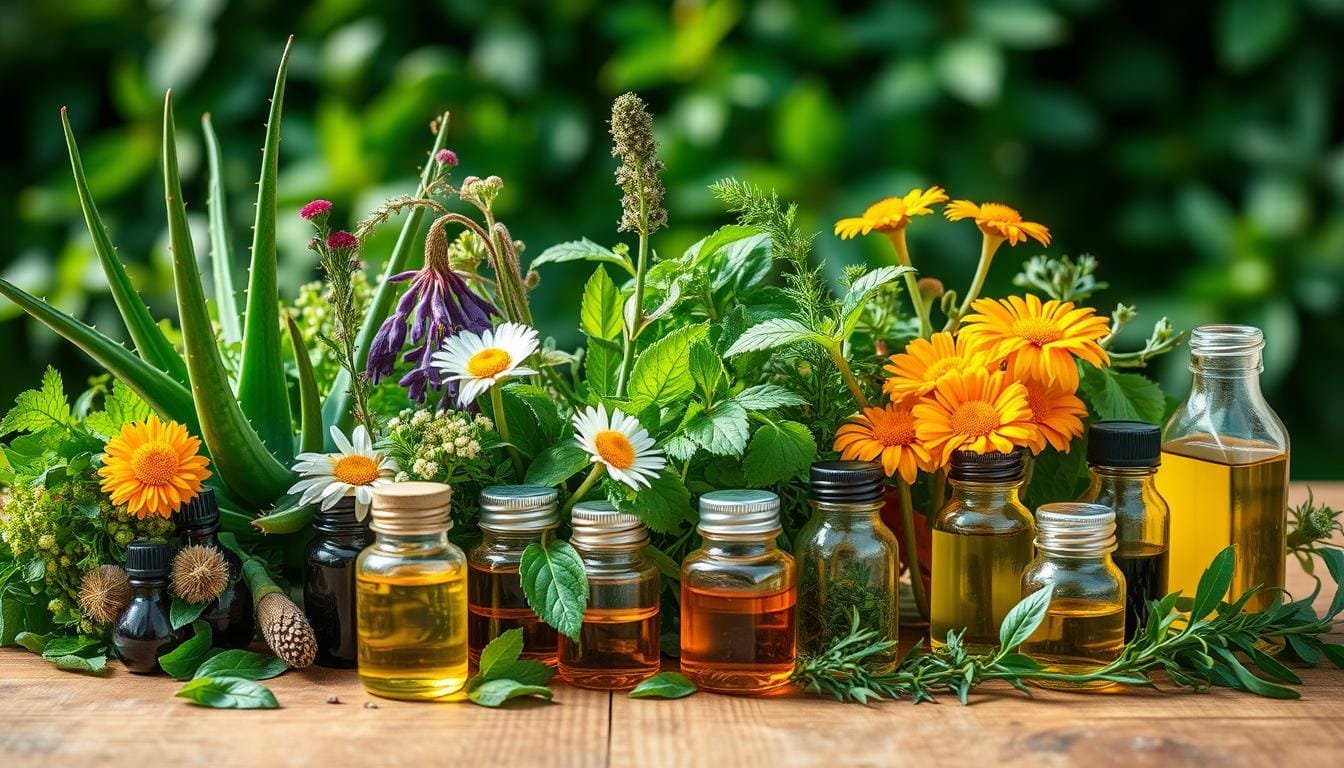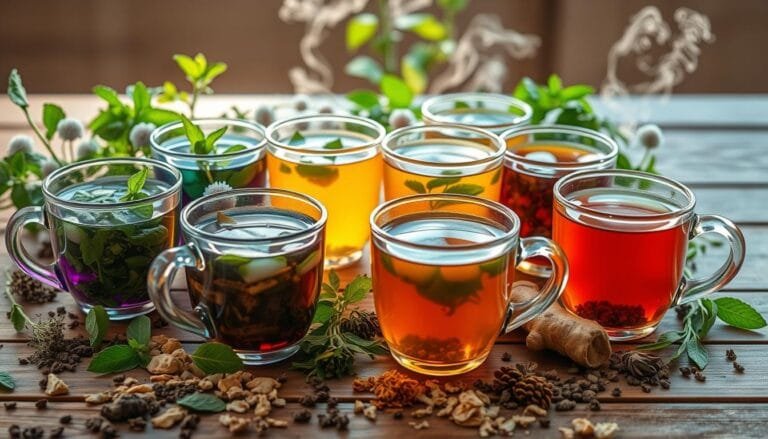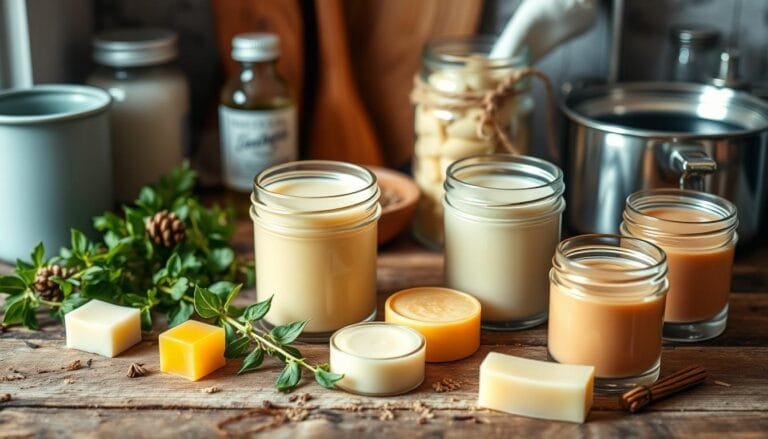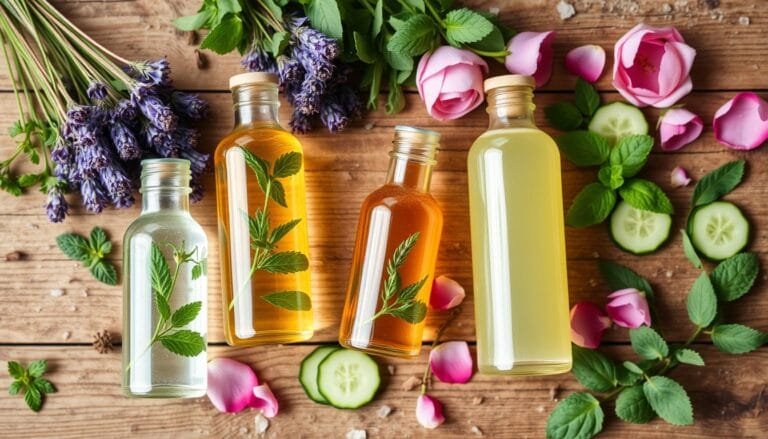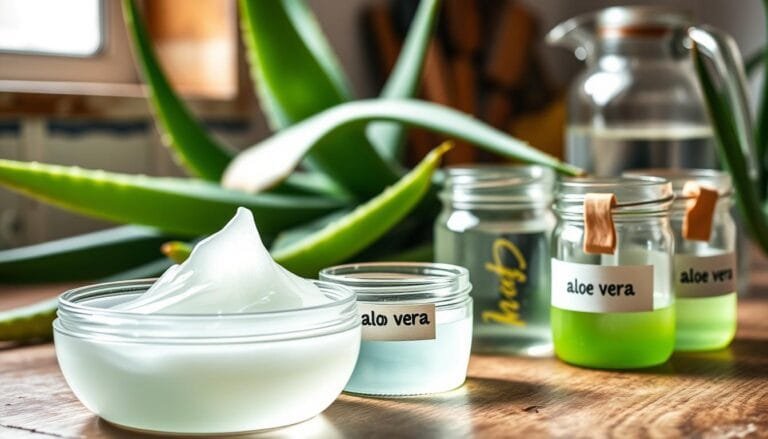I’ve always been curious about natural herbal remedies for skin issues. Herbal therapy for skin problems has a long history, dating back thousands of years in places like India and China. Today, more people are turning to these natural methods to avoid the side effects of chemical treatments.
In the United States, herbal therapy is becoming more popular. People are visiting alternative medicine practitioners more than doctors. Billions of dollars are spent each year on alternative therapies, including herbal remedies. Even though these products aren’t regulated as tightly as medicines, their long history and possible benefits make them appealing for natural skin care.
I’m excited to learn more about natural skin care. I want to look into the science and traditional knowledge on using herbal remedies for different skin issues. From acne and eczema to hyperpigmentation and even skin cancer, herbal treatments offer many options. By understanding botanical skin therapy and its cultural roots, we can find new ways to improve our skin health.
Understanding Traditional Herbal Medicine for Skin Care
Herbal remedies have a long history across many cultures. They come from ancient Ayurvedic traditions in India and Traditional Chinese Medicine over 4,000 years old. In the West, they started with Native American and European folk medicine, becoming more accepted today.
Evolution of Herbal Treatments Through History
Ayurvedic medicine, starting in India around 3000 BC, sees the body as a mix of five elements. It uses herbs to balance the body and improve skin health. Traditional Chinese Medicine, also very old, focuses on yin and yang and energy flow.
Key Principles of Botanical Skin Therapy
Western herbal medicine grew from folk traditions, influenced by many cultures. The rise in herbal products has led to more research. Now, healthcare providers need to know more about herbal treatments.
Cultural Impact on Herbal Remedies
Herbal remedies vary by culture and environment. Ayurveda uses Indian herbs like turmeric and neem. Traditional Chinese Medicine uses Asian plants like ginseng and goji berries. Native American and European folk medicines use local plants for skin issues.
The trend towards natural skincare is growing. It’s important to know the history and cultural value of herbal therapies. By mixing old wisdom with new science, we can fully use herbal treatments for better skin health.
Herbal Remedies for Skin Conditions: Scientific Evidence and Benefits
Scientific studies have shown that herbal remedies are great for skin health. Plants contain compounds like fruit acids and tannins. These help with many skin problems.
Fruit acids like citric, gluconic, and glycolic acids are good for acne. They clean out pores and lessen blemishes. Tannins help by tightening pores and controlling oil.
Aloe vera gel is very well-known for its skin benefits. It soothes burns, bites, and wounds. It’s also great for moisturizing all skin types.
Calendula is another herbal remedy with amazing benefits. It reduces inflammation and heals skin. It’s perfect for acne, chapped, or irritated skin.
| Herbal Remedy | Scientific Evidence and Benefits |
|---|---|
| Aloe Vera | Soothes the skin, treats burns, insect bites, rough skin, rashes, and wounds. Effective moisturizer for various skin types. |
| Calendula | Anti-inflammatory, calming, and healing properties. Beneficial for acneic, chapped, damaged, or irritated skin. |
| Fruit Acids (Citric, Gluconic, Glycolic) | Exfoliative properties help unclog pores and reduce blemishes, effectively treating acne. |
| Tannins | Natural astringent qualities that tighten pores and control excess oil production. |
Studies prove that herbal remedies are effective for skin health. They show the power of plants in skincare. As we learn more, herbal remedies will play a big role in the future of skincare.
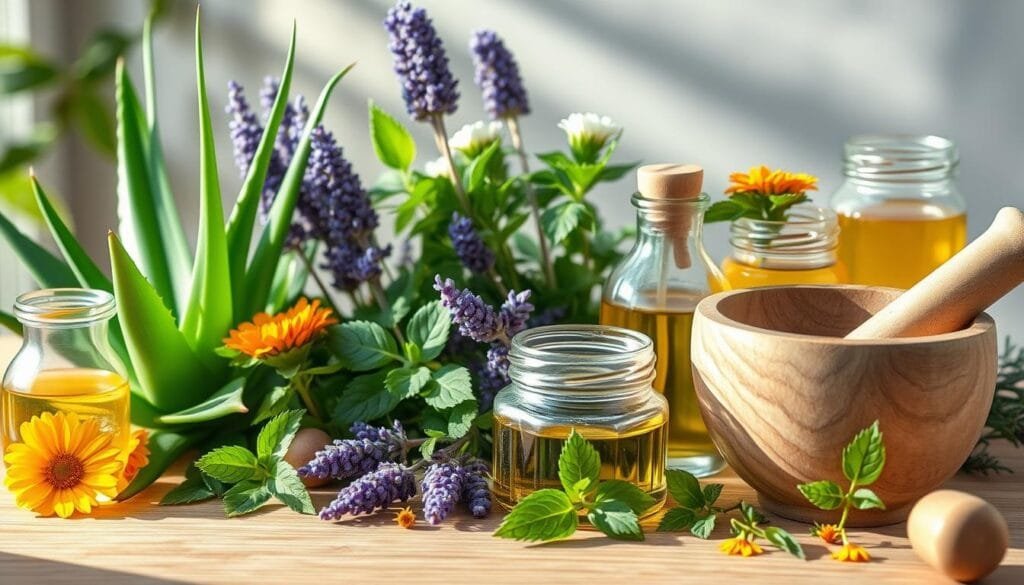
Power of Aloe Vera and Calendula for Skin Healing
Looking for natural ways to soothe and heal our skin can change everything. Aloe vera and calendula are two plant-based wonders. They’ve been helping with skin issues for centuries.
Therapeutic Properties of Aloe Vera Gel
Aloe vera gel is packed with goodness for our skin. It’s great for soothing sunburns, insect bites, and rashes. It also moisturizes and tones the skin.
Research shows aloe vera can heal burns faster than other treatments. It can make first- and second-degree burns heal in just 9 days.
Calendula’s Anti-inflammatory Benefits
The calendula flower is a treasure trove of benefits. Its orange petals are anti-inflammatory and calming. It’s gentle enough for acneic or irritated skin.
Calendula fights off fungi and bacteria. It’s perfect for healing bruises, cuts, scars, and sores. Studies prove it protects skin cells and boosts skin health.
Using aloe vera and calendula unlocks our skin’s natural healing. We can keep our skin looking radiant and healthy.
“Aloe vera and calendula are natural treasures that can transform the way we care for our skin.”
Essential Herbs for Treating Acne and Inflammation
Dealing with acne can be tough, but natural herbs might help. Herbs like basil, nettles, and turmeric are good for acne. They have anti-inflammatory and antibacterial properties.
Basil fights acne-causing bacteria. Nettles help with inflammatory skin issues, even in kids. Turmeric reduces inflammation and detoxifies the blood.
Other herbs like manjistha, neem, tea tree oil, and witch hazel are also useful. Manjistha prevents and treats acne. Neem is antibacterial and anti-inflammatory.
Tea tree oil reduces acne lesions. Witch hazel removes excess oil. Herbs like calendula, chamomile, lavender, and rosemary help heal acne too.
Herbal remedies are natural but can cause side effects. Pregnant and breastfeeding women should talk to a doctor before using them. Some herbs, like tea tree oil, are not good for sensitive skin.
Using natural herbs with proven ingredients like benzoyl peroxide and salicylic acid can help. This way, you can manage acne and get healthy, radiant skin.
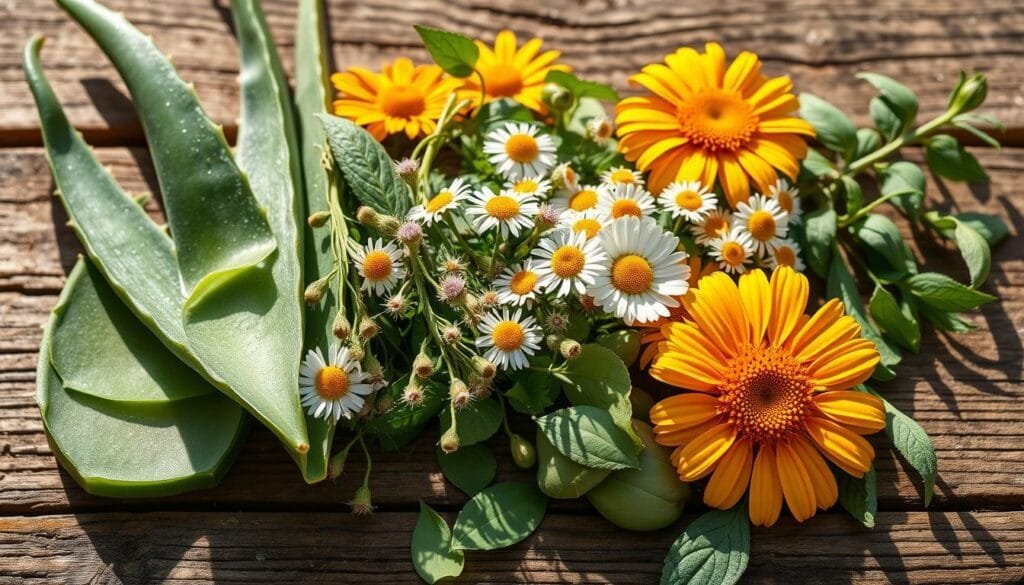
Natural Solutions for Eczema and Dry Skin
For those with eczema or dry skin, natural remedies can be a big help. Colloidal oatmeal and coconut oil are just a few options to try. They can make a big difference in how your skin feels.
Colloidal Oatmeal Applications
Colloidal oatmeal is made from finely ground oats. It has antioxidant and anti-inflammatory effects. These can help with itching, dryness, and scaling from eczema.
A 2015 study showed that using colloidal oatmeal lotion can improve eczema symptoms a lot.
Coconut Oil and Tea Tree Oil Benefits
Coconut oil is great for moisturizing dry skin. It has fatty acids that add moisture and anti-inflammatory properties. This helps protect the skin barrier.
Tea tree oil is also good for eczema. It has antibacterial and wound-healing abilities. This can help ease eczema flare-ups.
Honey-Based Treatments
Honey is antibacterial and anti-inflammatory. It can heal wounds and boost the immune system. This can help manage eczema.
Manuka honey is special for treating eczema. It has strong antioxidant and anti-inflammatory effects.
Adding these natural solutions to your skincare routine can help soothe and nourish your skin. It’s a gentle and effective way to care for your skin.
Herbal Oils and Tinctures for Skin Health
Herbal oils and tinctures are great for your skin. They use natural ingredients to help with many skin problems. This includes acne, dry skin, and more.
Rose hip oil is full of vitamin C and boosts your immune system. Comfrey oil comes from the plant’s flowers, leaves, and roots. It’s good for dry skin, bruises, burns, and eczema.
Dandelion tea can help with acne, boils, eczema, and psoriasis. You can use it on your skin or take it as a supplement. It’s good for your skin health.
Herbal oils and tinctures work well with your skin. They help it in a natural way. By using them, you can make your skin look vibrant and healthy.
| Herbal Preparation | Key Skin Benefits |
|---|---|
| Rose Hip Oil | High in vitamin C, boosts skin’s immune function |
| Comfrey Oil | Anti-inflammatory and regenerative properties, ideal for dry skin, bruises, and eczema |
| Dandelion Tea | Helps clear acne, address boils, eczema, and psoriasis |
“Herbal oils and tinctures offer a natural and holistic approach to nourishing and supporting healthy skin.”
Safe Application Methods and Proper Usage Guidelines
Using herbal remedies for skin issues requires careful preparation and following dosage guidelines. This ensures safe and effective use. Techniques like infusing herbs in oils, making soothing salves, and compresses are key. They unlock the natural healing power of these treatments.
Preparation Techniques
Herbs can be infused in oils like almond, coconut, or jojoba. This creates nourishing salves or balms. Herbal compresses, made by steeping herbs in hot water, are also popular. They apply the cooled liquid to soothe the skin.
For internal use, steeping times and dilution ratios are important. For example, lavender tea needs 5-10 minutes, while chamomile is ready in 3-5 minutes. Tinctures are made by soaking herbs in alcohol and water for weeks.
Dosage Recommendations
Dosage for herbal remedies varies by herb and condition. Start with small doses and increase as needed. Watch for any bad reactions. For topical use, a small amount is enough. Internal doses can range from a few drops to teaspoons, depending on the form.
Always consult a healthcare professional for herbal application, safe usage, dosage guidelines, and preparation methods. They can help ensure the best results and safety.
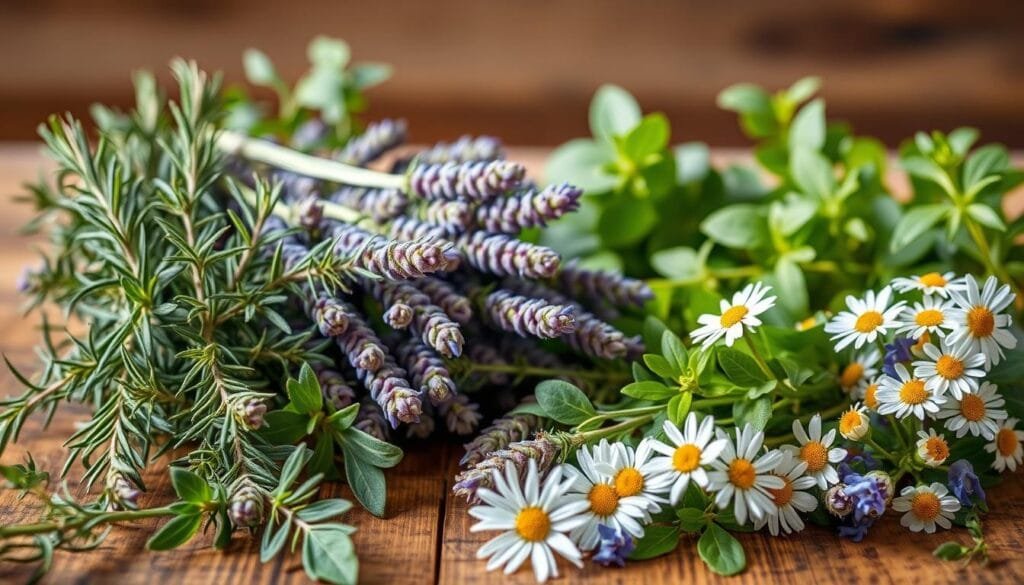
“The secret of getting ahead is getting started. The secret of getting started is breaking your complex overwhelming tasks into small manageable tasks, and then starting on the first one.” – Mark Twain
Combining Herbs with Modern Skincare Routines
The need for natural skincare is on the rise. Mixing herbal remedies with modern skincare is now popular. This mix of old and new offers a integrated skincare solution, tackling skin issues from all sides.
The herbal-modern combinations in skincare bring a holistic approach to better skin. By adding herbal extracts to everyday products, you get the best of both worlds. This means healthier, brighter skin.
For example, adding tea tree oil to your moisturizer boosts its fight against acne. Using aloe vera gel in skincare products can make them more soothing and hydrating. This is great for sensitive skin.
| Herbal Ingredient | Skin Benefit |
|---|---|
| Gotu Kola | Promotes collagen synthesis for improved skin elasticity |
| Green Tea Extract | Neutralizes harmful free radicals with its antioxidant properties |
| Turmeric | Offers natural anti-inflammatory effects to soothe and calm the skin |
Start slowly when adding herbal remedies to your skincare. Watch how your skin responds to the mix of old and new. Talking to a dermatologist or herbal expert can help you use these natural ingredients safely and effectively.
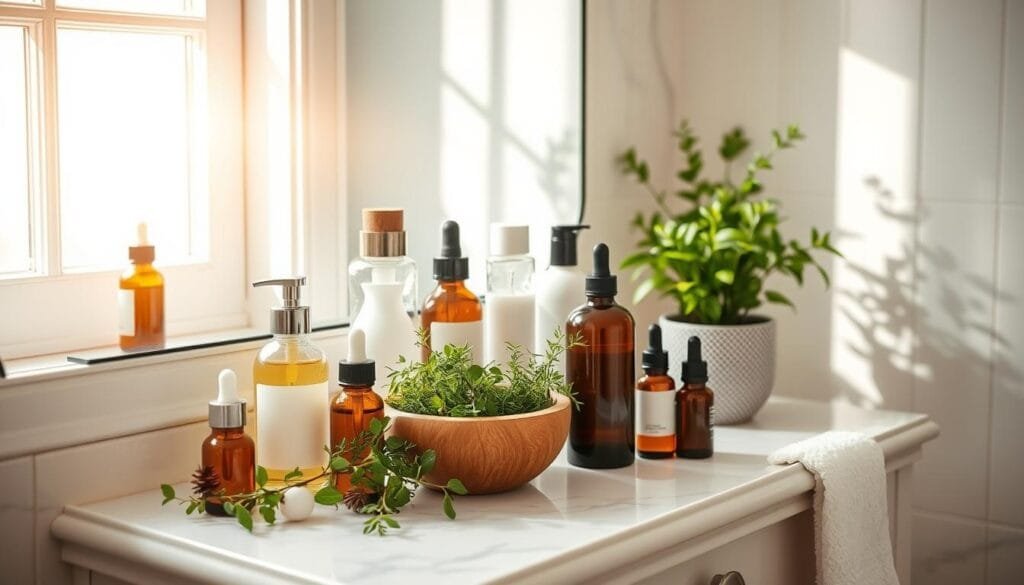
“The integration of traditional herbal wisdom with modern skincare innovations holds immense holistic skin health and radiance.”
Precautions and Possible Side Effects of Herbal Treatments
Herbal remedies can be helpful, but we must know about possible side effects. Some herbs might cause allergic reactions or skin irritation. Always do a patch test before using a new herbal treatment on a bigger area.
Some herbs can interact with medicines or not be good for certain health issues. Pregnant or nursing women should talk to a doctor before trying herbal remedies. It’s key to buy herbs from trusted sources to get the best quality. If you have a bad reaction, stop using it and see a doctor.
The NHS says some herbal supplements like aloe vera and garlic can have side effects. If you have health problems or take medicines, see a doctor. Knowing about herbal safety helps us use natural skin care safely and healthily.
FAQ
What is the history of herbal therapy for skin disorders?
What are the key principles of traditional herbal medicine?
What are some of the effective herbal remedies for skin conditions?
What are the therapeutic properties of aloe vera and calendula?
What other herbs are beneficial for skin conditions?
What natural ingredients can help with eczema and dry skin?
How can herbal oils and tinctures be incorporated into skincare routines?
What are the proper preparation techniques and dosage guidelines for using herbal remedies?
How can herbal remedies be combined with modern skincare routines?
What are the potentially side effects and precautions to consider when using herbal treatments?
Source Links
- https://www.ncbi.nlm.nih.gov/books/NBK92761/
- https://bhskin.com/blog/12-best-herbal-skincare-products-2022/
- https://pmc.ncbi.nlm.nih.gov/articles/PMC3931201/
- https://www.hopkinsmedicine.org/health/wellness-and-prevention/herbal-medicine
- https://www.mountsinai.org/health-library/treatment/herbal-medicine
- https://pmc.ncbi.nlm.nih.gov/articles/PMC3834722/
- https://www.auctoresonline.org/article/herbs-used-in-treatment-of-skin-disorders
- https://www.mountsinai.org/health-library/herb/calendula
- https://pmc.ncbi.nlm.nih.gov/articles/PMC6330525/
- https://www.healthline.com/health/beauty-skin-care/herbs-for-acne
- https://pmc.ncbi.nlm.nih.gov/articles/PMC4740760/
- https://curology.com/blog/herbs-for-acne-separating-fact-from-fiction/
- https://www.medicalnewstoday.com/articles/324228
- https://nationaleczema.org/blog/natural-treatments-for-eczema/
- https://www.healthline.com/health/natural-remedies-to-reduce-eczema-symptoms
- https://www.medicalnewstoday.com/articles/324149
- https://www.chagrinvalleysoapandsalve.com/blogs/idas-soap-box-blog/herbal-infusions-for-skin-care?srsltid=AfmBOopU_s249OrgTSdQlMWMUDJiP8ildkA56baBmKumukBUE7Ikyiam
- https://toupsandco.com/blogs/news/herbal-skincare
- https://www.rupahealth.com/post/top-evidence-based-herbal-medicine-and-essential-oil-options-for-skin-health-and-healing
- https://www.mayoclinic.org/healthy-lifestyle/adult-health/in-depth/skin-care/art-20048237
- https://pmc.ncbi.nlm.nih.gov/articles/PMC9572213/
- https://www.gaiaherbs.com/blogs/seeds-of-knowledge/how-to-use-herbs-for-skincare?srsltid=AfmBOoqRinm6pH-4Cs9pnCxXXg39T73pdP6jNuV6XeuoM0PnDiN77Nzj
- https://www.msartisan.com/blogs/news/combining-traditional-chinese-medicine-theories-with-skincare-and-the-beauty-industry?srsltid=AfmBOor9eDm7PC1XB6wxDOv_S_sc4u9c7kOHW1ueFFQ4Dv59Aj_yE-b1
- https://www.drtarekaesthetics.com/best-herbs-for-skin-regeneration/
- https://www.medicalnewstoday.com/articles/herbal-medicine
- https://pmc.ncbi.nlm.nih.gov/articles/PMC3887317/
